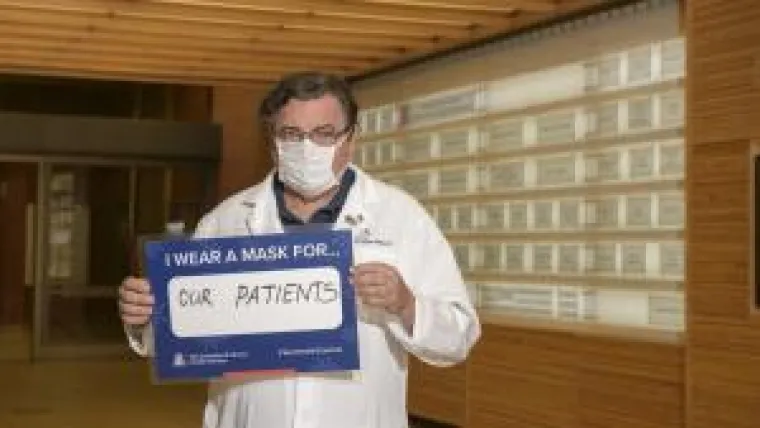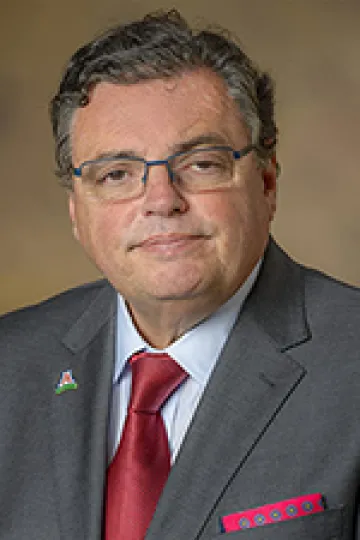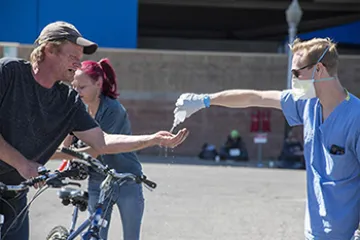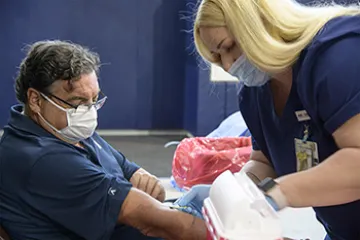Connecting with Dean Abecassis: Reflecting on a First Year

Michael A. Abecassis, MD, MBA, came to Tucson in November 2019 to lead the College of Medicine – Tucson as the newest dean at the University of Arizona Health Sciences.
Dr. Abecassis found a college full of passionate people and implemented significant changes to enable faculty and staff to realize their full potential. In the past year, Dr. Abecassis has created new degree programs, updated the college leadership structure, instituted a new focus on diversity in hiring and led the college through one of the most challenging health care crises in our lives.
He shared more about the present and future of the college, and the spark behind his penchant for quoting classical literature.
What are you most proud of in your first year at the University of Arizona Health Sciences?

I am very proud that we were able to continue on and even make progress on our mission despite all the issues that could potentially have derailed us – from COVID-19 to a national movement of confronting social injustices. These issues are – and should be – upsetting to everybody. I'm proud of our work to address both of those big challenges, and not let them stop us from excelling in our tripartite mission. Being able to keep the eye on the ball while getting through these challenges is easier said than done. But we have a job to do, whether it is taking care of patients, advancing the science, or making sure that our students and our trainees stay on track.
We were able to put teams together to make sure the students didn't miss a beat and were able to graduate on time, some even early. I am proud that our residents didn't miss out on their training. We kept our core missions intact, and even moved forward while we addressed these curveballs.
We also reorganized the Dean's office on advice from the Association of American Medical Colleges for a new leadership structure. They did an evaluation of our structure and recommended changes to clarify operational functions and roles for our core missions. We now have four vice deans, one each for education, research and graduate studies, faculty affairs, and diversity, equity and inclusion. We also have two administrative leadership positions: a deputy dean for finance and business affairs, and an executive director for strategy and chief of staff. We instituted a weekly meeting of this team to promote collaboration between our academic and administrative functions.
You also implemented two new educational programs: a research project requirement and a new bachelor's degree. Can you share more about those?
With our new scholarly project, every medical student will be required to complete a research project in which they develop a hypothesis, test it with existing data or gather data, and formulate conclusions. It's something that every major medical school does, and we were behind the ball on it. We're going to invest in having people run the program to help students find a project and a mentor. At the end of the project, they will have fully participated in the scientific method.

Second, our new bachelor's degree is designed to provide an undergraduate experience tailored to students interested in health care professions. In addition, we are creating a seven-year Accelerated Pathway to Medical Education, similar to what already exists at approximately 30 other medical schools whereby students are admitted into the College of Medicine – Tucson directly out of high school. Students will complete three years of undergraduate study in the area of their choice. They have to meet the prerequisites for medical school, like organic chemistry, and maintain a minimum GPA, but otherwise, they can study whatever they like. Then, they will automatically be admitted to medical school after three years of undergraduate education if they continue to meet the requirements.
This is a way to attract some students who might otherwise apply for undergraduate education at institutions significantly above us in the rankings. This program allows students to explore their interests without the sole focus being on stringent academic thresholds for admission into medical school.
The college has had a strong focus on equity, diversity and inclusion. Can you share why it is so critical for doctors, researchers and educators?
We cannot achieve true excellence without diversity, equity and inclusion. This issue is central across our tripartite mission.
Combatting racism is critical, and this includes developing our awareness of implicit bias or unconscious bias. Implicit biases can be based on how we were raised and can have a real impact how we think about issues. When I took these tests in the past, the questions really made me think. For example, if someone was raised with a stay-at-home parent, implicit bias training raises the possibility that this might affect their own decisions when evaluating prospective candidates in terms of gender bias. To be sure, at a conscious level this typically does not. But what about at a subconscious level? This is a simple example of how the training helps us generate an awareness of potential bias in how we shape our thinking. This is why we have made implicit bias training mandatory for all of our search committee members.
What is the most important accomplishment for you so far in your professional journey?

Dr. Abecassis takes a COVID-19 antibody test in 2020. I am most proud of my ability to create teams that are able to build programs. In my previous life as a transplant surgeon, that meant developing programs across the tripartite mission of medical schools: helping as many patients as possible, while advancing the science, and at the same time, being one of the best places to train the next generation of physicians. Transplant is an incredibly interdisciplinary specialty where we cross everything from medicine to surgery to psychiatry to laboratory. It is really a microcosm of what a college of medicine represents.
I am looking forward to continuing to do that here. I want to put together a team that has a lasting impact.
You frequently include quotes from authors or poets in your regular written updates to the college. Can you share what inspires you to choose these literary highlights?
There are several reasons. First, my father was a Latin and Greek, and French philosophy professor, so I grew up in an environment where one frequently quoted the classics. There is so much wisdom in literary works that generally applies to our everyday experiences. Second, my primary education was in French, and was heavily influenced by the classics. I actually won a French prose contest when I was in college at the University of Toronto for an essay on a French poet named Arthur Rimbaud. So, I have always had a passion for classic literature, particularly French and English literature. Whenever I see something going on in real life, I always remember something that someone said in the past. A lot of people have said things a lot better than I could ever say them, so why try to express a sentiment awkwardly when others have already expressed the same sentiment before so eloquently? I like to use quotes that are relevant to what might be going on; also, I hope that some might look up the author of the quote, and maybe read something they have written.

